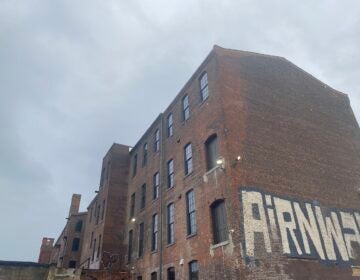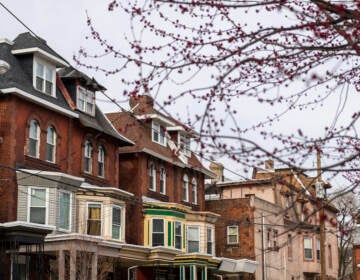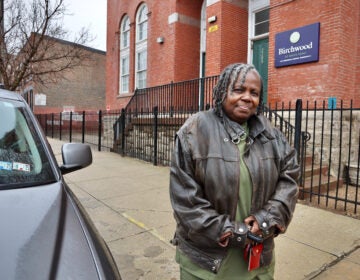‘We’re not lazy…we’re stuck’: Philadelphia residents call for action on housing crisis
City Council’s committee on poverty reduction held a hearing on housing. Residents spoke about barriers to homeownership, affordability and other issues.

A new house towers over its Northern Liberties neighbors. (Emma Lee/WHYY)
Aisha Bradley Veney just wants stability for her family.
A mother of seven, Aisha washed toilets at a Wendy’s and picked up popcorn in movie theaters while putting herself through law school. She and her husband have balanced work and childcare, battled health issues, pushed to get their own children through college. But one goal remains elusive: homeownership.
“I’m paying $1,500 in rent… I’m working to sustain my family, but I can’t buy a home,” Veney said Monday. “It just doesn’t seem fair.”
Veney was one of a half dozen North Philadelphia residents who spoke before city council members at a special hearing at Temple University on Monday night. The hearing was hosted by City Council’s new special committee on poverty reduction and prevention, which launched in October.
The committee’s strategy? Hold a series of public hearings in the city’s neighborhoods so that committee members can better serve low-income Philadelphians, both by creating new policies and programs and understanding the disconnect with existing, underutilized ones. The end goal: seeing 100,000 of those Philadelphians move out of poverty over the next five years.
Monday’s panel was the second of the series of three public hearings, each focused on a different topic: housing, jobs and education, and the social safety net. By the end of December, the committee aims to have a report ready with three to five concrete program recommendations, Billy Penn reported earlier this year.
That’s a quick turnaround for City Council, which has a reputation for creating special task forces with little to no measurable impact. But as the hearing progressed, it became clear from panelists’ testimony that they needed quick and actionable policy change.
“[I’m here] because what you’re talking about will help someone like me,” Veney told the committee members Monday. “We’re not lazy people that want a home. But we’re stuck.”
‘When are Philadelphians gonna be first?’
Philadelphia’s known as the poorest big city in the country, with a poverty rate nearly double that of the national average. Gentrification, poor-quality housing, and a shortage of units for low-income renters mean that even housing subsidized to be affordable often isn’t accessible to those who most need it.
It’s not just renters, either. The rate of homeownership in Philadelphia, and across the country, has dropped in the past few years. That’s particularly true for Black & Latinx communities in the city. Some North Philly residents, like Veney, struggle to find affordable homes that meet their needs. It’s doubly frustrating, Veney said, to see long-time residents being priced out of neighborhoods they’ve called home for generations while so much of the city’s housing sits abandoned.
Ruth Birchett, founder of the Heritage Community Development Corporation, has lived in the same North Philadelphia community for 70 years. As one of those long-time residents, her issue isn’t with people moving into the neighborhood, but with the developers she says aren’t amenable to her and her existing neighbors’ needs. She described the city’s 10-year tax abatement — now in play at City Hall — as one driver of displacement.
“When PHA begins to sell off what they view as surplus properties, wholesale to investors, what’s going to be the impact for those of us or homeowners here in North Philadelphia?” she asked. “The impact is that we’re going to be eventually priced out of our homes, that those people who are capable of gaining access to tax credits, to build and take advantage of tax abatements… they gain an advantage over us.”
In the end, Birchett said, she questioned the city’s priorities. “When are Philadelphians going to be first?”
City Council President Darrell Clarke, who pushed for the public hearings on poverty reduction, said last week that he recognizes the need to reform the tax break on new residential construction.
“Most people in the city of Philadelphia think it should be adjusted,” Clarke said last Thursday. “The economy has changed. The market has changed. The abatement achieved its goal of stimulating significant growth.
Moving toward solutions
While many people who spoke at the hearing agreed on the problems, there was no consensus on the solutions.
Some wanted to expand or collaborate with existing programs. Markita Morris-Louis, chief strategy officer for Compass Working Capital, spoke about the financial services’ nonprofit Family Self-Sufficiency program, which works with clients receiving housing assistance from Philadelphia Housing Authority on building financial assets.
Others suggested that the current programs weren’t working for current residents, and argued that the city should work to restore already vacant houses or invest in community land trust programs that enable long-term affordability. City officials broke ground earlier this month on one such trust, which will create five permanently affordable housing units in gentrifying Point Breeze. The neighborhood is one of many with existing homeowners stretched thin by growing financial burdens as rising property values increase taxes and aging homes demand repairs.
Michael Froehlich, a legal aid lawyer with Community Legal Services, aimed his policy recommendations at helping these homeowners stay in their homes. He suggested policies that would help people manage municipal liens and modify loans to prevent foreclosure.
Currently, the city has five tax abatement programs for homeowners, programs like the Homestead Exemption, the freeze on real estate taxes for low-income seniors and the Longtime Owner Occupant Program, known as LOOP. All of these are designed to mitigate the impact of rising property taxes on longtime residents. But many panelists suggested more work must be done to ensure these programs meet the needs of the low-income communities they aim to serve. They suggested additional benefits for both renters and homeowners in neighborhoods with high rates of displacement, including repair and restoration help, tenant opportunity purchases, and suspension of homeowner billing penalties.
The final hearing, which focuses on jobs and education, is scheduled for Dec 5th. The special committee’s end-of-year report is due less than a month later. And Philadelphians will be paying attention to the outcome.
As one panelist told the room, “Plans are plans. Actions speak.”
WHYY is your source for fact-based, in-depth journalism and information. As a nonprofit organization, we rely on financial support from readers like you. Please give today.







